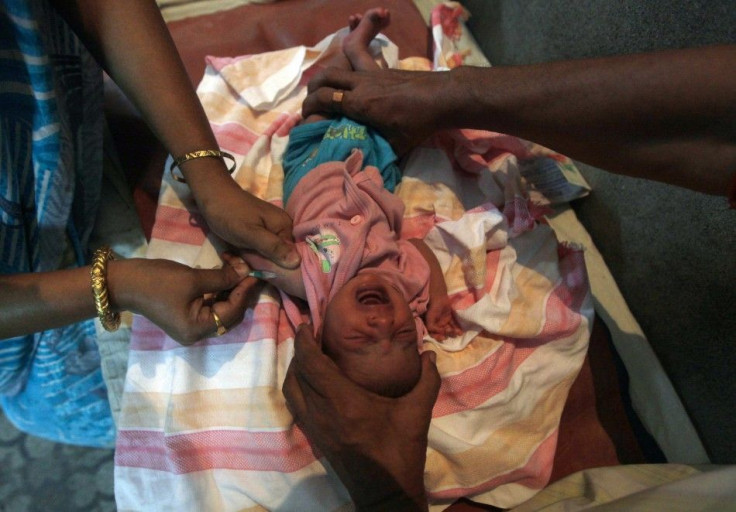Get Vaccinated For Whooping Cough - Like Right Now, Says CDC
Pertussis cases on track to break half-century record in world's most developed country

The U.S. Centers for Disease Control and Prevention is urging all pregnant women, all children and anyone who comes in contact with babies to schedule an appointment to be vaccinated for an infection that sounds like something out of a Charles Dickens novel: whooping cough.
Seven months into the year, the CDC has already registered almost 18,000 cases of the respiratory infection caused by Bordetella pertussis bacteria. That's twice the number of pertussis cases than were reported last year and approaching the number (27,000 cases) reported in 2010. This makes the 70s look good in comparison, when cases of the infection were at record lows since the government began tracking the bacteria in the 20s.
The cause of the return of a preventable respiratory infection: parents are either not keeping up with vaccination schedules, or they're opting out altogether, possibly fuelled in part by the anti-vaccination movement of recent years. Or, perhaps, the vaccine is not as effective as thought.
Too many people are not up to date on their pertussis vaccine, and too many parents are choosing not to vaccinate their children, Dr. Christina Hermos of the Division of Pediatric Immunology and Infectious Diseases at UMass Memorial Children's Medical Center said in an interview published Saturday on GoLocalWorcester of Massachusetts. The vaccine is very effective but not 100 percent effective, therefore, the small population of unvaccinated people can put many others at risk, even those who have been vaccinated.
Dr. Anne Schuchat, director for the National Center for Immunization and Respiratory Diseases at the Atlanta-based CDC, said Thursday during a press briefing that the country might hit a 53-year peak in pertussis.
We may be on track for record high pertussis rates this year. We may need to go back to 1959 to find a year with as many cases reported by this time so far, Dr. Anne Schuchat, director for the National Center for Immunization and Respiratory Diseases at the Atlanta-based government agency, said Thursday during a press briefing announcing the findings. So, there is a lot of pertussis out there, and I think there may be more coming to a place near you.
Schuchat said the spike in recent years might also be linked to a replacement to the traditional vaccine that was made in the late 90s over concerns that the earlier version that had been in use for decades -- which had brought down infection rates to record lows -- caused rashes and fever.
The tetanus, diphtheria and pertussis, or Tdap, shot is recommended for children before entering grades six and nine. A second shot is a booster to the first. The DTaP is the same vaccine in different doses that is prescribed for infants up to 18 months and toddlers up to six years. These vaccines have to be regularly boosted. The CDC recommends five doses for children over time and one dose in adulthood.
The infection causes long-term, gradually harsher coughing fits that last extended period of time, up to six weeks. Adults are susceptible to the invasion, too, but the main reason they should be vaccinated is to prevent them from passing the sickness to the young who are at higher risk of mortality. The most common vector for infection to the young is from caregivers and older siblings.
The term whooping comes from the wheezing sound made by infected people while breathing. Complications that can lead to death include pneumonia and bacteria caused encephalopathy.
Freaked out yet?
Some parents are.
In Beckham County, in July, we provided about 386 doses. We usually have about 40, 50 doses, Karen Weaver, the director of six county health agencies in western Oklahoma, told the Associated Press.
Other parents appear to still fear the vaccine more than the infection, thanks to unsubstantiated claims in recent years that vaccines cause adverse health effects.
Some people are still believing some reports put out about 10 years ago that their child could be getting harmed by the vaccine or vaccine preservatives, Diane Holm, a representative of the Lee County, Fla., health department, told the Naples Daily News in a report published Saturday.
Washington state, where over 3,000 cases were have been reported this year, or 16.6 percent of all cases nationwide, has the highest rate of parents declining vaccines for their children, but the CDC has said this is probably not a root cause since vaccinated children have also been exposed to the infection, according to a report in the Associated Press.
Whatever the root causes, parents in the United States are statistically unlikely to experience the death of an infant due to the illness, although they might encounter a scary hospitalization or emergency room visit if they choose to ignore the CDC's warnings.
Only nine babies -- 0.05 percent of reported cases - have died in the U.S. so far in 2012. The infection killed 195,000 infants worldwide in 2008, according to the World Health Organization, despite an estimated 83 percent vaccination rate. The areas of the world where a baby is most likely to die from pertussis are also the least developed: west and central Africa and Afghanistan.
© Copyright IBTimes 2025. All rights reserved.






















